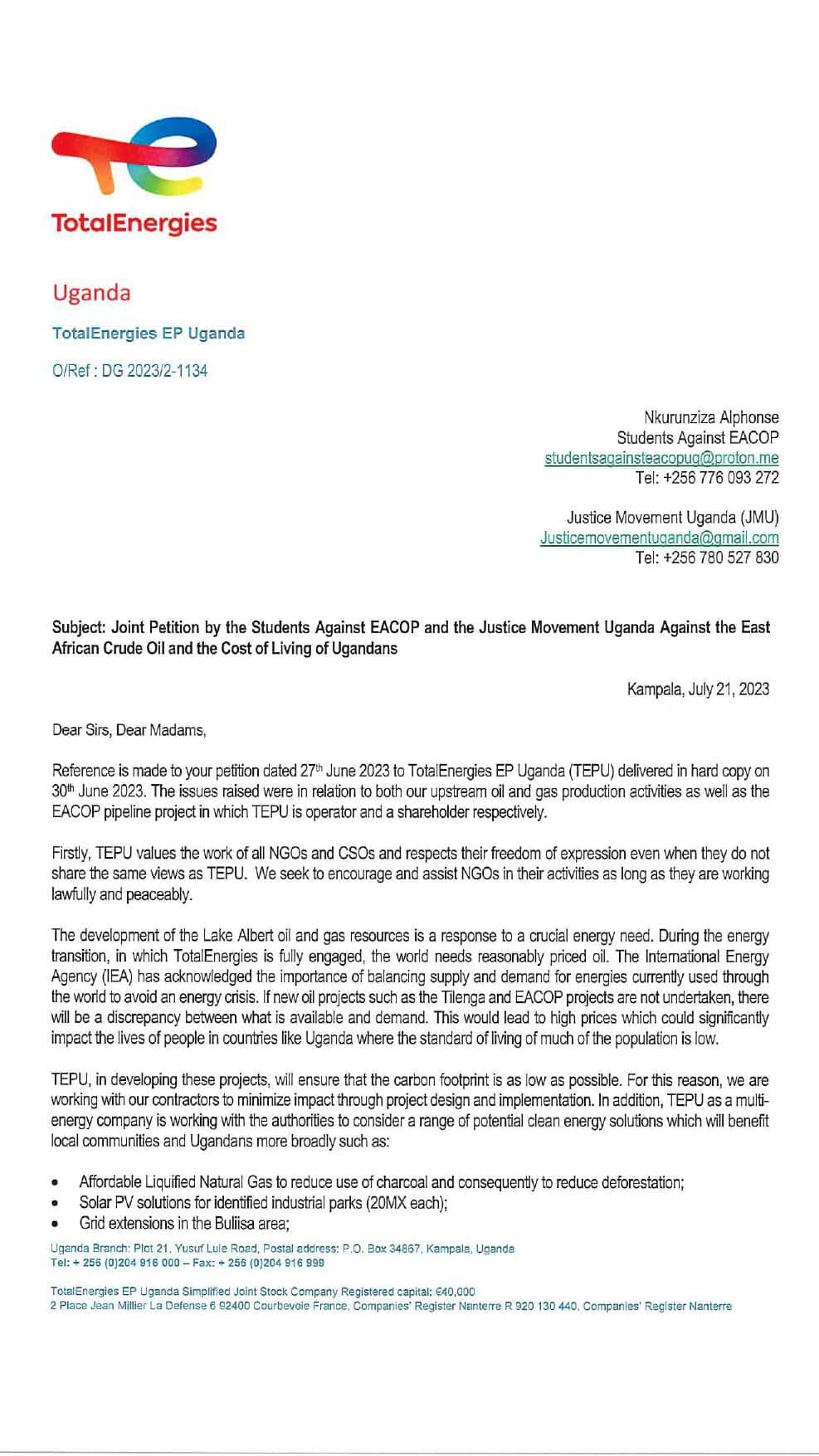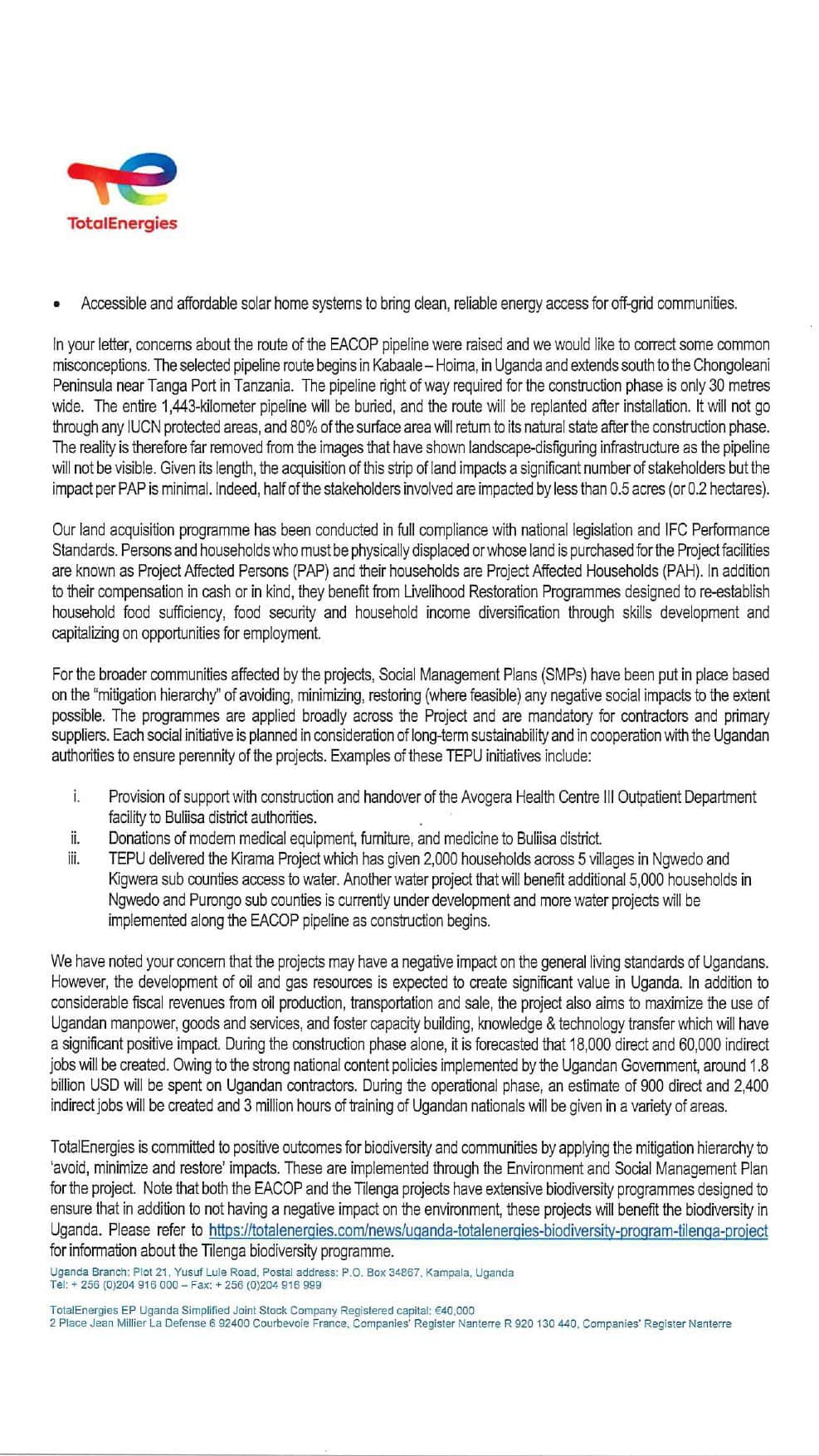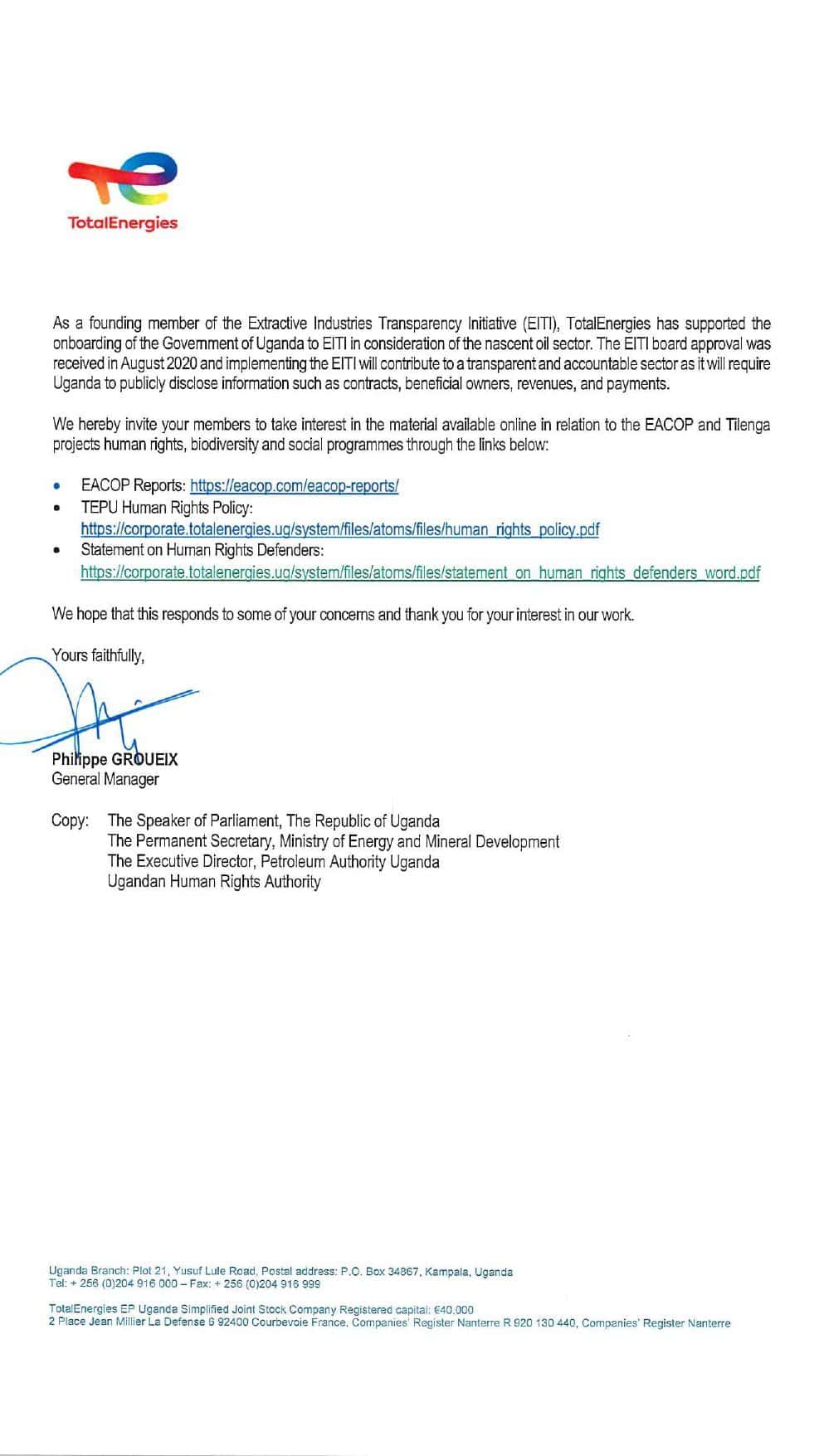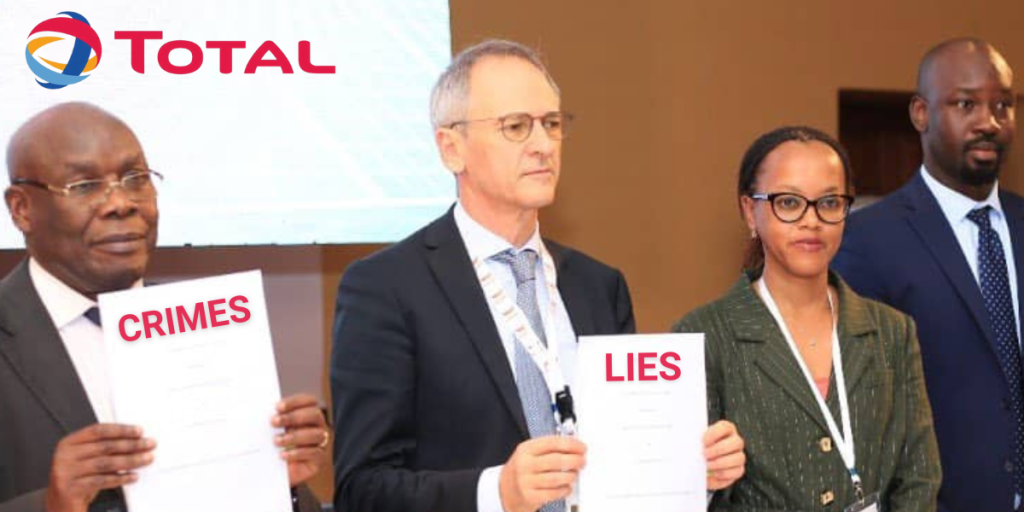“Thank you for your interest in our work”. That’s how Philippe Groueix, the man in charge of TotalEnergies’ East African Crude Oil Pipeline (EACOP), signed off his letter addressing the “concerns” of students in Uganda working to stop his company. Just a month earlier, one of the students was kidnapped for three days, beaten and interrogated. His crime? Delivering a petition to the Ugandan government against Philippe’s project. “We seek to encourage and assist NGOs in their activities as long as they are working lawfully and peacefully”, Groueix writes.
Students Against EACOP Uganda are on the frontlines of the war against humanity. In a country where protest requires police authorisation, they are resolutely nonviolent. Meanwhile, EACOP has been formally condemned by the EU Parliament,1 while TotalEnergies is fighting allegations of violating the human rights of the people living in its 1443km path of destruction in French courts.2 More than 260 community and not-for-profit organisations have called for all financing of EACOP to stop, and many banks have agreed.3 Perhaps Philippe could identify which NGOs TotalEnergies will “encourage and assist”.
There is nothing peaceful about the 379 million tonnes of carbon that EACOP will transport towards our atmosphere.4 But, Philippe claims, “during the energy transition, in which TotalEnergies is fully engaged, the world needs reasonably priced oil”. He says that, if EACOP doesn’t proceed, high energy prices could “significantly impact the lives of people in countries like Uganda”. He wants us to believe TotalEnergies is working for Ugandans, even referring (albeit unspecifically) to the International Energy Agency (IEA) to back this up.
Never mind the fact that the IEA actually called for an end to all investment in oil and gas in 2021.5 Never mind the fact the IEA’s figures show that only 9.8% of Uganda’s energy comes from oil.6 Never mind the fact that the Ugandan government has claim to only 15% of the oil the pipeline will transport.7 Never mind the fact that TotalEnergies, and, in all likelihood, the Ugandan government, will export the oil to sell on international markets, at international prices.
Why lie, Philippe? Is it because your pipeline will carve through the land that 100,000 people rely upon to live and grow food?8 Or maybe it’s because nearly a third of the pipeline will run through the basin of Lake Victoria, a source of fresh water for 40 million people,9 and your company is committed to the least expensive means of constructing it.10 An oil spill in the area would put millions of lives in danger, including those of the already-endangered animals living in the biodiversity hotspots along the route. Or maybe you are lying because the pipeline will emerge by a stretch of sea that is at risk of tsunamis.11
But don’t think about that, Philippe urges. Despite the many chilling environmental and humanitarian assessments of EACOP, he says many of these concerns are just “common misconceptions”. Think logically, the “entire 1,443-kilometer pipeline will be buried”, you won’t even see it after the bulldozers have gone! And here’s another comforting thought: TotalEnergies will bring jobs to Africa. “During the construction phase alone, it is forecasted that 18,000 direct and 60,000 indirect jobs will be created”. Yes, okay, Joseph Mawejje, a World Bank economist, says that after construction, such projects only retain 25% of the jobs initially created.12 However, that’s actually more than what Philippe himself predicts from EACOP, where he estimates just “900 direct jobs” will remain. Great news!
And, on Philippe’s side, is the Ugandan government, ready to hold TotalEnergies to its commitment to “positive outcomes for biodiversity and communities”. The fact that 23% of Uganda’s budget is estimated to be lost to corruption every year is nothing to worry about, right?13 The frequent imprisoning of opposition politicians and human rights defenders by law enforcement are probably just blips in the normally well-functioning democracy the government upholds.14
None of this, sadly, is new. The cost of oil and, in particular, EACOP’s colonial oil, is clear for anyone who looks. Businessmen like Philippe know the repercussions of their work. They just don’t care enough to change course. And, until now, they’ve been able to rely on repressing local communities to minimise opposition.
No longer. The unfolding crime Phillipe and his colleagues are committing is being resisted by young people who have had enough. To continue their work they will have to publicly walk over Students Against EACOP Uganda. The lies in Philippe’s condescending letter will be forced into the light of day by brave people standing between their communities and his bulldozers. Their resistance will show just how little he cares about human rights, peace, and the law.
We can help Students Against EACOP Uganda stop this pipeline and deal another blow to those who are destroying everything we love. Financial support from ordinary people is the difference between keeping Students Against EACOP Uganda safe, effective and in the public eye. It is the difference between another victory for big oil on the frontlines of its war against humanity, or another step to safety for all of us.
Please donate what you can afford to help Students Against EACOP mobilise and carry out their fourth wave of action.
Read Philippe’s full letter below…



References
- https://www.europarl.europa.eu/doceo/document/RC-9-2022-0409_EN.html
↩︎ - https://www.amisdelaterre.org/communique-presse/totals-tilenga-eacop-projects-paris-civil-court-dodges-issue/ ↩︎
- https://www.stopeacop.net/banks-checklist
↩︎ - https://www.theguardian.com/environment/2022/oct/27/east-african-crude-oil-pipeline-carbon ↩︎
- https://www.iea.org/news/pathway-to-critical-and-formidable-goal-of-net-zero-emissions-by-2050-is-narrow-but-brings-huge-benefits ↩︎
- https://www.iea.org/countries/uganda
↩︎ - https://www.jstor.org/stable/j.ctvt9k690.14?seq=11 page 183
↩︎ - https://www.stopeacop.net/for-people ↩︎
- https://oxfamilibrary.openrepository.com/bitstream/handle/10546/621045/rr-empty-promises-down-line-101020-en.pdf ↩︎
- https://www.eia.nl/docs/os/i72/i7228/7228_advisory_report_eacop_uganda_27_june_2019.pdf page 5 ↩︎
- https://www.amisdelaterre.org/wp-content/uploads/2022/10/eacop-a-disaster-in-the-making-foe-france-and-survie-oct-2022.pdf ↩︎
- https://www.jstor.org/stable/9699218a-dc81-318d-9ac2-11558108bcdf?seq=11 page 150 ↩︎
- ↩︎
- https://www.amnesty.org/en/location/africa/east-africa-the-horn-and-great-lakes/uganda/report-uganda/ ↩︎

